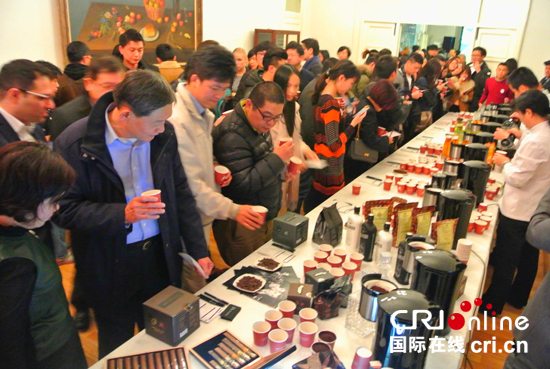Columbia Coffee tasting held to explore the unique charm of Colombian Coffee

Colombia Ambassador to China Delivers Speech at the Tasting Meeting

Tasting meeting site
International Online Report (Reporter Li Ping): Recently, sponsored by Colombia Trade Promotion Group (PROCOLOMBIA), Colombia Coffee Producers Association and co-sponsored by Colombia Embassy in China, Colombia Coffee Tasting Meeting was held in Beijing. The tasting meeting provided more than ten different brands of Colombia roasted coffee for Chinese and foreign guests, so that people could taste the purity and fragrance of Colombia coffee.
Unlike Brazilian coffee, Colombia coffee has a soft and smooth taste and a long aftertaste, capturing coffee lovers all over the world with its unique aroma and balanced taste experience. It has a fruity and even red wine acidity, combined with chocolate and nutty sweetness, and finally with a hint of bitterness, sweet and bitter complement each other, Colombia coffee has an unparalleled taste.
Juan Pablo Carrillo, an export consultant for Colombia's trade promotion group, said Colombia coffee has a perfect taste thanks to its unique growing environment: "Colombia is located in the north of South America, surrounded by the Caribbean Sea, the Pacific Ocean and the Andes Mountains. This geographical environment makes coffee producing areas like spring all the year round, moderate rainfall, conducive to the growth of coffee beans. In addition, because the production area is located in mountainous areas, large-scale industrial picking cannot be carried out. So far, local farmers still adopt manual labor mode, and even tractors are difficult to use."
This relatively "primitive" production method allows the local natural resources to be protected to the greatest extent. In recent years,"experiential tourism" accompanied by "coffee picking" and "coffee making" has also created new tourism growth points for Colombia. Colombia Ambassador to China, Ms. Carmensa Haramiyu, said,"People interested in Colombia coffee are generally concentrated in the age of 20-40, and they are also the main consumers of tourism products. We are holding this tasting today to let this group of people know about Colombia coffee and our country. Some people will ask me why I don't recommend adding sugar and milk to the taste. This curiosity about Colombia coffee will translate into curiosity about the country as a whole, and even Chinese people will be interested in Colombia music, salsa dance, gems and historical sites."
Today, more and more Chinese people recognize Colombia coffee and appreciate its flavor, which is inseparable from the efforts of the Colombia Coffee Producers Association. Wu Jiahang, chief representative of the association for Greater China, said,"The coffee trade between China and Colombia started 15 years ago, but it developed slowly at first. In 2006, we opened a representative office in China. Four or five years later, with more Colombia boutique coffee and specialty shops entering the Chinese market, the coffee trade between China and Colombia entered a period of rapid growth, and the demand for quality coffee among Chinese customers also increased. As the world's largest supplier of fine coffee, Colombia has taken advantage of the situation and expanded its coffee exports to China year by year."
The biggest difference between fine coffee and ordinary coffee is that it pays more attention to the origin and cultivation links. In Colombia coffee exports, primary coffee bean raw materials account for 90 per cent of the share. So when we talk about Colombia coffee, we focus more on where it comes from. Wu Jiahang told reporters that the most popular products in the Chinese market are Linglong, Huilan and Cauca from southern Colombia and Snow Mountain Coffee from the north. Since 2010, Colombia has also begun to promote roast coffee belonging to different brands in China."Juan Valdez is the most famous roast coffee. It entered the Chinese market eight years ago and now Chinese consumers can easily buy it in large supermarkets. Today, we also brought different brands of roasted coffee to you at the tasting meeting, hoping to give Chinese consumers more choices. We hope that with such efforts, Chinese consumers will understand how to appreciate and taste high-quality coffee."
Source: International Online
Important Notice :
前街咖啡 FrontStreet Coffee has moved to new addredd:
FrontStreet Coffee Address: 315,Donghua East Road,GuangZhou
Tel:020 38364473
- Prev

If coffee is not used for brewing, in what form will it appear? The beauty of artistic coffee
Coffee has been an enduring drink since the first day it was discovered. Because coffee beans contain caffeine, people get excited physically and mentally after taking it. In ancient times, it was used to reward soldiers before the battle, and now it is a refreshing drink for people to work. People may talk about their love of coffee for three days and nights. Now let's
- Next

Go to Seoul, meet my brother and become an international barista with SCAE certificate
If you want a second life, pay attention to Suzhou Hive Youth Club. Koreans love coffee. They like to date, study and talk about business in the aroma of coffee. Most Korean cafes have warm lights, warm and chic decoration, soft music, and a barista with a fresh smile. Everything is just like the warmth and romance of Korean TV dramas. If you want to fit into this picture,
Related
- What grade does Jamaica Blue Mountain No. 1 coffee belong to and how to drink it better? What is the highest grade of Blue Mountain coffee for coffee aristocrats?
- What are the flavor characteristics of the world-famous coffee Blue Mountain No. 1 Golden Mantelin? What are the characteristics of deep-roasted bitter coffee?
- Can I make coffee a second time in an Italian hand-brewed mocha pot? Why can't coffee be brewed several times like tea leaves?
- Hand-brewed coffee flows with a knife and a tornado. How to brew it? What is the proportion of grinding water and water temperature divided into?
- What is the difference between Indonesian Sumatra Mantinin coffee and gold Mantinin? How to distinguish between real and fake golden Mantelin coffee?
- What does bypass mean in coffee? Why can hand-brewed coffee and water make it better?
- Unexpected! Ruixing Telunsu lattes use a smoothie machine to foam milk?!
- % Arabia's first store in Henan opens into the village?! Netizen: Thought it was P's
- Does an authentic standard mocha coffee recipe use chocolate sauce or powder? Mocha Latte/Dirty Coffee/Salty Mocha Coffee Recipe Share!
- What is the difference between Vietnam egg coffee and Norway egg coffee? Hand-brewed single product coffee filter paper filter cloth filter flat solution!

